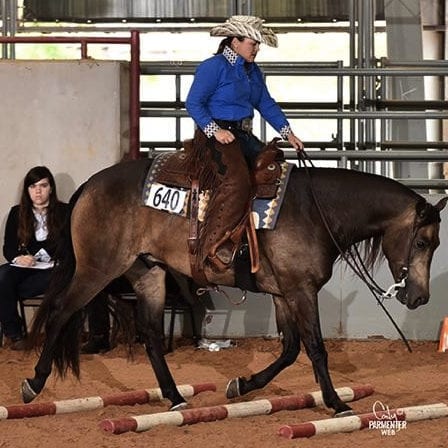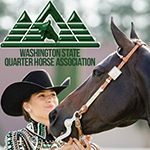If you’ve shown horses long enough, you have undoubtedly experienced a moment or moments when your horse needs to be schooled in the show pen.
Horses are intelligent creatures that eventually become privy to what the show pen is all about and many will eventually take advantage of that fact.
It has been said many different ways, but one that resonates well is, “if you want a horse with no brain, get a motorcycle.”
Moreover, young horses are well, young horses, and will certainly act as such at times.
In order for a horse to have long-term good habits in the show pen, schooling is a necessary tool.
But when and how should you school your horse? What is off limits and how do judges feel about schooling?
GoHorseShow talked to AQHA Professional Horsewoman Julie Voge of Whitesboro, Texas, AQHA Judge Jennifer Thompson of Reno, Nevada, and AQHA Amateur competitor Meg DePalma-Whelan of Evans, Georgia to get their opinion on what is the proper etiquette of schooling in the show pen.
They all believe there is a way to handle the situation with grace and class. It starts with…
R.E.S.P.E.C.T.
Many times when we discuss proper etiquette, one common theme seems to dominate all the rest. And it really doesn’t matter what is being discussed. Like pretty much everything else, proper schooling etiquette comes down to one thing: respect.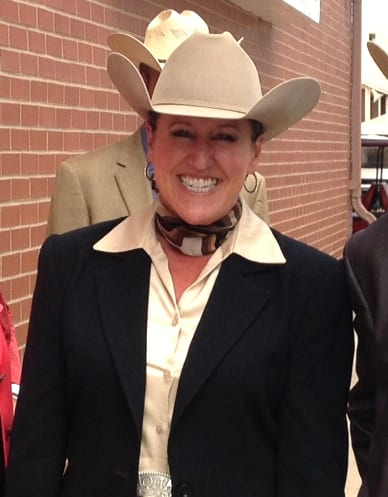
Jennifer Thompson (pictured right) firmly believes, “Schooling is one hundred percent acceptable to judges as long as it is respectful to everyone. This includes your other competitors, the judges, your horse, and the audience.”
“You need to look around you first and see what it going on if you decide to school,” said Julie Voge. “It is not acceptable to mess up anyone’s ride so you can school. Get off the rail and ride to the center to fix what you need to fix. Schooling should never affect another rider’s go.”
In addition to being respectful to the competitors around you, everyone said the respect toward your horse is vital when it comes to schooling appropriately.
“Schooling should never be dangerous or abusive,” said Voge. “You should never be mean or aggressive toward your horse.”
Meg DePalma-Whelan agreed and said, “That’s uncalled for anywhere, let alone in the show pen. If you need to school don’t make a scene or draw attention to yourself. Definitely don’t be the cause of someone’s bad ride just because you are having one.”
“When people get emotional about their ride going south, that’s where judges will draw the line,” said Thompson. “It’s just not okay. It’s disrespectful to everyone when people get too harsh.”
Thompson pointed out that most judges are horsemen themselves, and while they understand a rider’s frustration, they have to insist that you stick to the point of schooling (correcting the unwanted behavior) while leaving your emotions at the door.
Finally, Thompson suggested exhibitors think about the spectators watching in the stands. The ones who are thinking about getting into the industry and then see an abusive schooling session happening in the middle of the show pen.
“It sends a negative message to the people watching in the stands and that is absolutely unacceptable,” Thompson adds.
Where and How Should You School?
Knowing how to be respectful when you school is one thing, but what about knowing where to school and how to let the judge know?
Voge said, “Schooling should really be reserved for the smaller, weekend shows and be avoided at the bigger shows. It does happen at big shows sometimes, but again, it should never affect another rider’s go and should be minimal.”
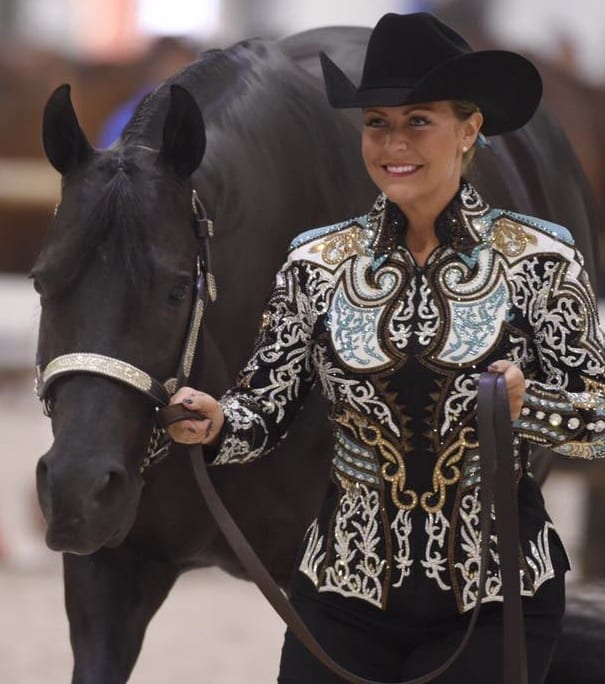 “You never want to school at the big shows,” said DePalma-Whelan (pictured left). “But if your horse’s bad behavior is affecting other people’s rides you have to do it.”
“You never want to school at the big shows,” said DePalma-Whelan (pictured left). “But if your horse’s bad behavior is affecting other people’s rides you have to do it.”
Thompson agreed, adding, “If you are at a big show like the World or Congress and your horse is just not able to get it together, the best thing to do is to retire to the middle of the arena and wait to be excused.”
Voge also suggested that if the show is running late, to just try and get through the class out of respect (there’s that word again!) for everyone.
When asked if an exhibitor should ever approach the judge or steward about schooling, both trainer and judge said there are ways of doing it without actually having a conversation.
“I think the most appropriate way to go about it is to do something that is an immediate disqualification,” said Voge. “Like putting your free hand on the rein and then thank the judge(s) on the way out. From the outside in, direct communication between exhibitors and judges doesn’t look appropriate so you can let them know in a nonverbal way what your intentions are.”
“If an exhibitor has made the decision to school before the class even begins, as a judge, I completely appreciate that,” said Thompson. “For example, in a class like reining when the exhibitor walks in and puts their free hand on the rein and sends me a look to let me know, it makes it all much more relaxed for both the judge and the exhibitor.”
Who Should School and In What Classes?
DePalma-Whelan said, “As an Amateur competitor, my hope is never to school and for my horse to always be a good soldier. But that isn’t always going to happen. I have always waited for my horse to actually do something undesirable before I school, and I never make the decision to school before the class, but considering the time and money that goes into these horses, if they are being naughty we need to fix it.”
DePalma-Whelan also mentioned that generally youth and amateur tend to try and do a quick, correct, and effective maneuver when the judge isn’t looking so they can still try and have a successful class without obviously schooling.
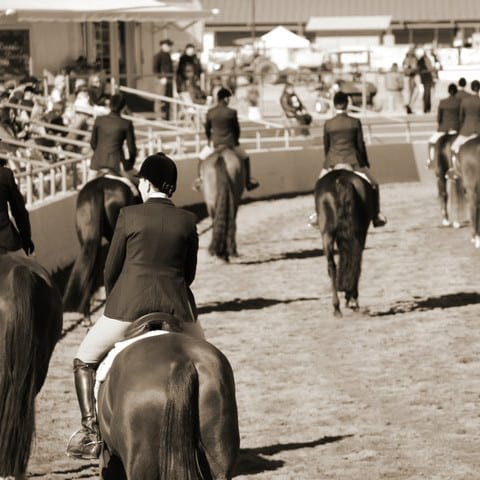 Judges don’t discredit that strategy either.
Judges don’t discredit that strategy either.
“Please keep in mind that there are tricky, discrete ways to get it done,” said Thompson.
Voge and Thompson also agree that if a horse needs schooling it does not matter the class or the person aboard or beside the horse.
“We (judges) understand that when a youth or amateur is showing, horses are only good for so many runs before they get a little cheat to them. So, it is perfectly acceptable for a youth or amateur to school their horse in any class,” said Thompson.
“Amateurs and youth can absolutely school, but they need to follow the same rules as trainers and absolutely be respectful,” said Voge.
When it comes to pattern classes, you are generally allotted a certain amount of time to complete the pattern, and it is okay to use that time for the fee you paid if you need to school… with some discretion.
“For example, if you need to school on the gate in a trail class and make them stand for several seconds, that should be okay,” said Voge.
However, if at any point in any pattern class you need to school, once you have completed your schooling, proper etiquette is to excuse yourself.
“If you end up having to school in the middle of the pattern, it isn’t appropriate to finish,” Voge said, “and be sure to thank the judges as you leave.”
Final Thoughts
Sometimes, owners may have a hard time understanding why schooling is sometimes necessary.
Voge suggests that trainers, “have communication from the beginning with their clients. Talk about the plan and your program before ever going to the shows. It will save a lot of unnecessary aggravation later.”
“As an owner, I trust my trainers and the decisions they make,” said DePalma-Whelan. “If my horse needs to be schooled, I am perfectly fine with my trainers schooling in the show pen assuming the horse needs it.”
Finally, if you need to school in a rail class, judges, like Thompson, appreciate when you maintain the same gate as your fellow exhibitors unless it is near the very end of the class.
In all reality, the idea of schooling in a show pen should not be a taboo one, and the general consensus among all parties (exhibitors, trainers, and judges alike) is that as long as proper etiquette is displayed, it is a necessary and purposeful tool in order to create and maintain the great show horses we all know and love.
Photos © Cody Parmenter, Jeff Kirkbride, Danielle Long


